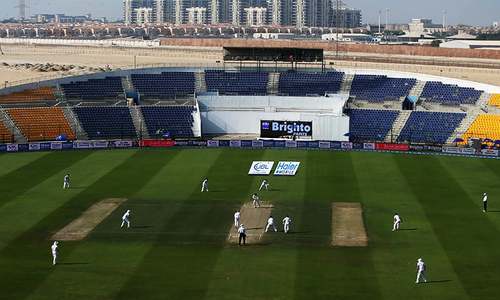
KARACHI: Taimoor Ali Khan, a Pakistani sports psychology consultant based in the United Kingdom, has expressed his desire to work with the Pakistan cricket team on its upcoming tour of England.
A former first-class cricketer, who played for Islamabad in the 1990s as all-rounder, is a highly-educated, having done MBA and MSc in Elite Performance Sport Psychology from the School of Sport, Health and Exercise Science at the Bangor University, Gwynedd in Wales and has been based in the UK since 1999.
Taimoor, 39, has the added distinction of being the first Pakistan-born to complete a thesis on cricket and while talking exclusively to Dawn from Nottingham on Saturday, he stressed the need to attach a sports psychologist with the Pakistan squad on what is expected to be a demanding tour in the coming weeks — their first Test trip to England since the spot-fixing controversy rocked the cricketing world in 2010 when the then Pakistan skipper Salman Butt, Mohammad Asif and Mohammad Amir were banned by the ICC for their involvement.
“Countries like Australia, England, India and South Africa realise the importance of mental training along with physical and skill training which is evident from their performance. At the top level players selected have the skill set and emphasis is given on their physical conditioning but mental training is of immense importance at that level,” Taimoor emphasised.
“In order to be successful and achieve greatness you are not only required to have the skill set or physical toughness but mental training is also of utmost importance.
“The way cricketers or other athletes practise their skills in their respective sport in the same manner they need to practise psychological interventions to achieve mental toughness to have longevity in their career.”
Analysing the importance of sports psychology, Taimoor offered to help Pakistan put up their best possible performance by working in liaison with the players, majority of whom have not played Tests in England.
“As a sport psychology consultant, my mental workout training emphasis on the identity statement, performance statement, visualisation, imagery, effective goal-setting, personal reward programme, solution-focused tools and mental toughness,” he remarked.
“In my thesis on cricket I developed a vision, support and challenge measure and transformational leadership behaviors, predicting vision, support and challenge within team sport.
“I believe that insecurity and uncertainty creates fear among Pakistan team cricketers which has a negative effect on their performance outcome.
“To enhance the performance and produce great results there is a need to build a strong team culture based on targeted behaviours such as inspirational motivation, intellectual stimulation, individual consideration, fostering acceptance of group goals, appropriate role modeling, performance expectations and contingent reward for positive reinforcement.
“On such a demanding and long tour of England continuous psychological and physiological support is of utmost importance for the Pakistan cricket team,” Taimoor said.
“As we are all aware that after the spot-fixing scandal on the previous trip [in 2010] this is going to be the first Test series between the two countries in England. Therefore, there will be immense pressure on players.
“The Pakistani players undoubtedly will be under a lot of scrutiny from the British media. The importance of a sport psychology consultant is of great importance for this tour,” Taimoor added.
Taimoor also narrated an interesting story of how the Pakistan Cricket Board (PCB) approached him last year in a bid to hire his services. In fact, he flew down to Lahore from England and personally held a detailed meeting with PCB executive committee chief Najam Sethi.
“Yes, I can confirm that about a year back I was approached by the PCB to work with the Pakistan national team as a sport psychology consultant but unfortunately it [the deal] didn’t materialised due to unknown reasons.”
But investigations carried by Dawn revealed that it was the rigid stance of PCB director game development Aizad Sayid that prevented Taimoor from joining the Pakistan setup after being recommended by Dr Tim Woodman, head of Bangor University’s Sport Science School where Taimoor studied.
“During their correspondence, Aizad raised objection to Taimoor’s Urdu accent and wrote to Taimoor that it would serve no purpose at all for the Pakistan team or anyone else who would sought his advice,” sources close to the PCB confided to Dawn.
To this, Taimoor has this to say: “I’m very much a Pakistani who remains patriotic to the country of his birth. My Urdu is not that bad as Mr Sayid has pointed out. In fact, his objection caught me by surprise because I have worked with a number of Pakistan players in personal capacity. And not a single of them ever had any linguistic problem as to how we communicated. So language was never an issue.”
The sources confirmed that Azhar Mahmood, the former Pakistan all-rounder, had strongly recommended Taimoor to the then head coach Waqar Younis and PCB when he was associated as a part-time bowling consultant for the Asia Cup and the World T20 earlier this year.
Taimoor, who holds a British passport, also helped the UAE prepare for the 2015 World Cup at the insistence of then UAE head coach and ex-Pakistan Test paceman Aaqib Javed.
It makes a fascinating reading that the support staff of Pakistan squad has five foreigners in Mickey Arthur (head coach), Grant Flower (batting coach), Grant Luden (trainer), Shane Hayes (physiotherapist) and Steve Rixon (fielding coach).
Since joining the Pakistan team, Arthur has brought in Hayes and Rixon, the former Australian wicket-keeper who had been part of Australia squad in 2013 when Arthur was its head coach. And none of them speak Urdu, a language Taimoor is well versed with.
Published in Dawn, June 19th, 2016












































